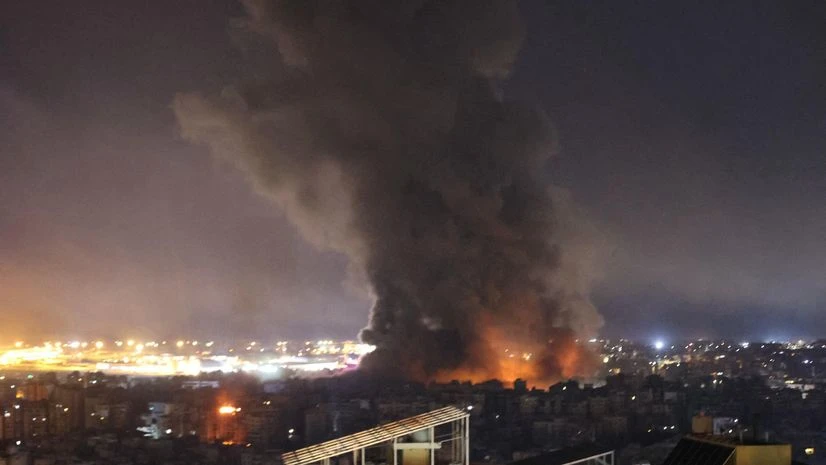Israel expanded its targets in its war with Hezbollah militants in Lebanon on Monday, killing at least 21 people in an airstrike in the north, Lebanon's health ministry said, while millions of Israelis took shelter from projectiles fired back across the border.
So far the main focus of Israel's military operations in Lebanon has been in the south, the Bekaa Valley in the east and the suburbs of Beirut.
The strike in the Christian-majority town of Aitou hit a house that had been rented to displaced families, the town's mayor Joseph Trad told Reuters. In addition to the deaths, eight people were injured, the Lebanese health ministry said.
Israel ordered residents of 25 villages in southern Lebanon to evacuate to areas north of the Awali River, which flows some 60 km (35 miles) north of the Israeli frontier.
At the Masnaa border crossing with Syria, Jalal Ferhat, his wife and five children were among those offloading belongings from buses, hoping to leave Lebanon.
"There are strikes in our neighbourhood and destruction, and they (Israeli forces) hit near my house," said Ferhat, 40, from Baalbek, a Hezbollah stronghold in eastern Lebanon. "I have children, you can't just stay where you are. We tried going to another place...we had to leave again."
In central Israel, residents rushed to shelters as sirens sounded. The military said three projectiles that had crossed from Lebanon had been intercepted. Israeli fighter jets struck the launcher from which the projectiles were fired, it added. No injuries were reported.
More From This Section
The conflict between Israel and Iran-backed Hezbollah resumed a year ago when the militant group began firing rockets at Israel in support of Palestinian militants Hamas at the start of the Gaza war, and has escalated sharply in recent weeks.
Israeli strikes have killed at least 2,309 people in Lebanon over the last year, the Lebanese government said in its daily update. The majority have been killed since late September when Israel expanded its military campaign. The toll does not distinguish between civilians and combatants.
Israel says its operations in Lebanon are aimed at securing the return of tens of thousands of people displaced from their homes in northern Israel.
Israel at odds with UN peacekeepers
The Israeli military said it had killed Muhammad Kamel Naim, commander of the anti-tank missile unit of Hezbollah's elite Radwan Force, in a strike in the Nabatieh area of south Lebanon.
Hezbollah did not immediately comment.
The operations come amid tensions between Israel and the U.N. peacekeeping force UNIFIL in south Lebanon, as Israel keeps pushing forces through the area in an attempt to wipe out Hezbollah and its military infrastructure while it also battles Hamas in Gaza.
The U.N. said Israeli tanks had burst into its base on Sunday, the latest allegations of Israeli violations against peacekeeping forces.
Israel disputed the U.N. account and Prime Minister Benjamin Netanyahu said UNIFIL were providing "human shields" for Hezbollah, an allegation Hezbollah denies.
Meanwhile, the entire Middle East remains on high alert for Israel to retaliate against Iran for an Oct. 1 barrage of missiles launched in response to Israel's assaults on Lebanon.
The Pentagon said on Sunday it would send U.S. troops to Israel along with an advanced U.S. anti-missile system.
On Monday, the U.S. embassy in Lebanon strongly encouraged its citizens to leave "now", warning that additional flights laid on by the government to help U.S. citizens leave since Sept. 27 would not continue indefinitely.
The Israeli military took foreign journalists into southern Lebanon on Sunday and showed them a Hezbollah tunnel shaft that was less than 200 metres away (650 feet) from a UNIFIL position, as well as weapon stashes that the troops found.
"We are actually standing in a military base of Hezbollah very close to the U.N.," Brigadier General Yiftach Norkin said, pointing to the shaft's trapdoor in an area covered by undergrowth and overlooked by a U.N. observation post.
Since announcing its ground operation near the border, the Israeli military says that it has destroyed dozens of Hezbollah tunnel shafts, rocket launchers and command posts.
Hezbollah tunnel netwrork
Hezbollah possesses an extensive tunnel network in southern Lebanon, which Israel estimates extend for hundreds of kilometres. A Hezbollah field commander told Reuters last week that the tunnels "are the foundation of the battle".
UNIFIL has said previous Israeli attacks limited its monitoring abilities and U.N. sources say they fear any violations of international law in the conflict will be impossible to monitor.
European Union foreign policy chief Josep Borrell said EU member states had taken too long to condemn Israel's attacks on UNIFIL soldiers, describing them as "completely unacceptable".
Spanish Prime Minister Pedro Sanchez urged EU members to respond to a request by Madrid and Ireland to suspend the bloc's free trade agreement with Israel over its attacks in Lebanon and Gaza.
EU countries, led by Italy, France and Spain, have thousands of troops in the 10,000-strong peacekeeping mission.

)
